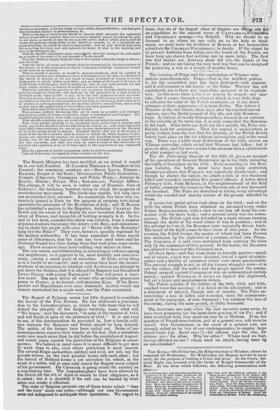it, for the unfortified part has been destroyed—still remains . and
it still remains in the hands of the Poles. Warsaw has not capitulated, nor is there any immediate prospect of its capitula- tion. In this news there is the less reason to suspect any mis-
take, that it comes through a channel which is very little dispc to enhance the value of the Polish resistance, or to cry down,
attempts of their oppressors—it is from Berlin. The letters n Warsaw of the 3rd March, three days after the reported surrus express, says the Berlin journal of the 8th, not only firmness, hope. A battery of twenty-four-pounders, fornied on an eminena. in the suburbs of the town, has, it is said, compelled the Russians to fall back. lithe town can hold out for a month, the Poles con- fidently look for assistance. That the capital is undisturbed, is pretty evident from the fact that the drawing of the Polish Bonds lottery took place on the 1st without interruption, and in the usual way. There was a letter from Rotterdam of the 15th, shown on 'Change yesterday, which stated that Warsaw had fallen ; but it gave no date, and the news seems to be no more than a rifacinzento of what reached us last week.
The St. Petersburg Gazette of the 26th ult. gives an account of the operations.of General DIEBITSCH up to the 20th, including the battle of Groschow on the 19th. Even according to the Rus- sian bulletin, the battle must have been nobly contested. DisnirscH allows that PAHLEN was repeatedly driven back ; and though he claims the victory, he admits a loss of Iwo thousand killed and wounded, including five general officers. A letter, dated February 27th, from Melosna, in the neighbourhood of the field of battle, estimates the losses on the Russian side at two thousand five hundred. The Poles are described as taking every advantage which the wooded and marshy nature of the ground afforded to them.
A .severe but partial action took place on the 23rd; and on the 25th the whole Polish force attacked an advanced corps under Prince SCHACHAFSKOI, with a view to cut him off from his con- nexion with the main body ; and a general action was the conse- quence. The Polish right was defended by a rapid stream running through the midst of the wood where it was in position ; and in the attempt to turn it, the Russians were repeatedly driven back. The brunt of the fight seems to have been at this point. In the evening, the Polish troops, the centre of which had been thrown into confusion by the explosion of a caisson, retired into Praga. The .Russians, it is said, were restrained from entering the town only by the command of their general. In this battle, the Russians are allowed to have lost five thousand men.
All these facts—and they come from no friendly quarter—speak not of valour, which was never doubted, but of a spirit of combi- nation and a fertility of resources which were more questionable. The present struggle is not, as all the former struggles were-Lit is not the nobles, but the nobles and the people against the enemy. Poland arrayed against CATHERINE was an aristocratical faction merely ; against NICHOLAS it arrays an injured and depressed, but yet a brave and magnanimous nation.
The Polish bulletin of the battles of the 20th, 23rd, and 25th, reached town this morning : it is dated on the 6th instant ; and is a document of interest, though not of novelty. The Poles ac- knowledge a loss in killed and wounded, since the- commence- ment of the campaign, of nine thousand ; but estimate the loss of the enemy, during the same period, at thirty thousand.


























 Previous page
Previous page